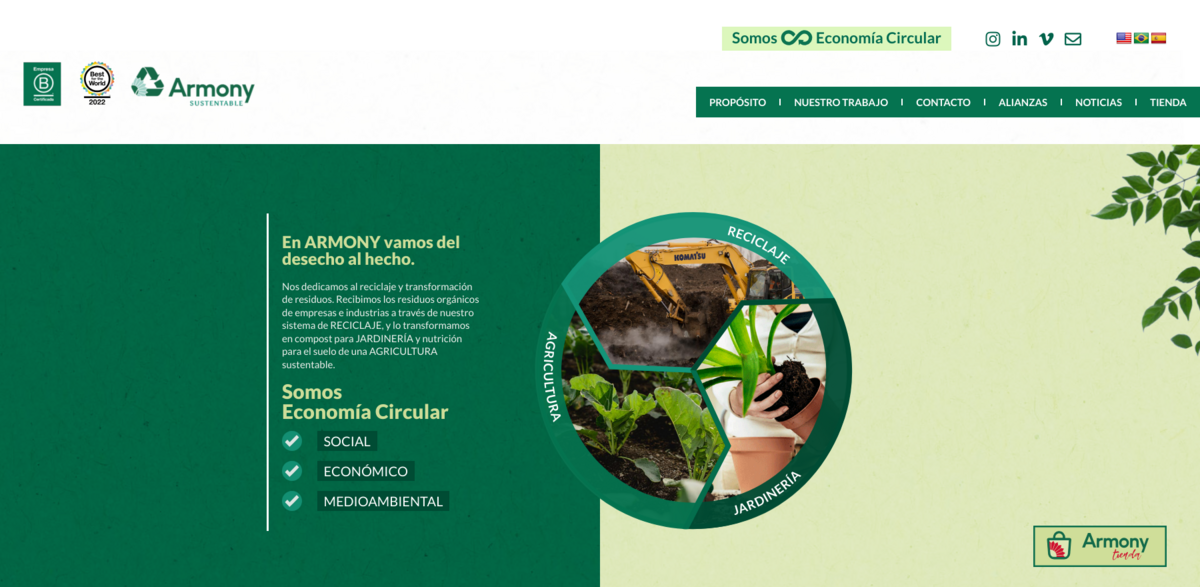What is Armony’s Circular Economy Project?
Armony is dedicated to recycling and transforming waste into valuable resources by employing a comprehensive circular economy strategy. The project focuses on taking organic waste from companies and industries through a specialized recycling system and transforming it into compost for nurturing gardens as well as food for sustainable agriculture. Armony Sustainable Gardening Products, Armony Sustainable Recycling Services, and Rosario Sustainable Agriculture Products are some of the remarkable initiatives that form this endeavor, all operating under the guiding principles of Social, Economic, and Environmental sustainability. The project illustrates how transforming waste into productive goods not only mitigates the significant ecological debt but also supports the transition toward a cleaner, safer, and more traceable production cycle.
Main Benefit of the Project
Armony’s approach turns environmental challenges into opportunities by adding a high degree of value at every stage of production. Key figures and facts include:
- Bcorp score of 110.5, showcasing its commitment to responsible business practices.
- Conversion of 58% of organic waste generated in Chile into useful raw material, addressing a critical need.
- The incredibly low recycling rate of just 1% for organic waste in the country highlights the urgency for change.
- Integration into the production cycle by creating compost for gardening and biofertilizers for agriculture, thus closing the circular economy loop.
- The positive environmental impacts achieved by transitioning local industries towards sustainability, along with social and economic development.
Sustainable Gardening and Agriculture Impact
Armony Sustainable Gardening Products focus on returning 100% natural inputs to the soil, leading to enriched parks and gardens. The compost made from recycled organic waste nourishes the land and improves its fertility, making gardening practices more sustainable. Meanwhile, Rosario Sustainable Agriculture Products further complement this initiative by offering biofertilizers that complete the circular economy cycle in agriculture. The project stands as a pioneering example where the remnants from waste management are revalued technologically and innovatively, resulting in natural and ecological products that benefit both the soil and future food production.
Innovative Recycling Services
The recycling arm of the project, known as Armony Sustainable Recycling Services, operates from its organic waste recovery plant located in Pudahuel. This state-of-the-art facility demonstrates a modern, clean, and traceable process that reintegrates recovered waste into the production chain as a new raw material. The recycling services offer a comprehensive and tailored approach, ensuring that every step of the conversion helps add a sustainable edge at every stage of business operations. The system is not merely a solution to waste management—it is an innovative narrative that encourages industries to view waste revalorization as a path to a better future.
Environmental, Social, and Economic Integration
Armony’s strategy transcends traditional recycling by embracing a tripartite integration of environmental, social, and economic benefits. The project champions the idea that sustainability is no longer optional, but an essential obligation for today’s society. The process transforms environmental liabilities into assets for nature, thus promoting responsible consumption of resources while supporting economic development and fostering community well-being. As the project evolves, it continuously adapts to address the growing necessity for sustainable practices in every facet of industry and urban life. Casual conversations about change often include phrases like, “I want to be sustainable, I can be sustainable, I must be sustainable”—a sentiment that resonates with the mission at hand.
Project Impact on Global SDGs
- SDG 12: Responsible Consumption and Production – by converting waste into bio-fertilizers and compost, the project promotes sustainable production practices.
- SDG 13: Climate Action – reducing organic waste in landfills helps mitigate greenhouse gas emissions and supports global climate goals.
- SDG 15: Life on Land – revitalizing soil quality in parks, gardens, and agricultural lands directly supports the maintenance of terrestrial ecosystems.
- SDG 11: Sustainable Cities and Communities – establishing recycling and sustainable gardening services enhances urban environmental resilience.
- SDG 9: Industry, Innovation, and Infrastructure – the use of traceable and innovative recycling processes demonstrates effective industry transformation towards sustainability.
Looking Towards a Sustainable Future
Armony’s circular economy approach leaves no stone unturned when it comes to nurturing the planet for future generations. Emphasizing that the current ecological debt—illustrated by the fact that 2.5 planets would be required to support the present level of consumption—has reached critical limits, the project encourages an immediate shift towards sustainable practices. Armony supports those who have already embarked on sustainability journeys, assists those with the capacity to change, and leads the charge in anticipating mandatory shifts in environmental practices. The initiative promotes a dynamic conversation about sustainability, echoed across platforms like Instagram, LinkedIn, and Vimeo, and reinforced through informational hubs like the official website. This forward-thinking approach ensures that natural resources are respected and continuously revalued, ultimately crafting a legacy of environmental stewardship that benefits social and economic landscapes alike.


















